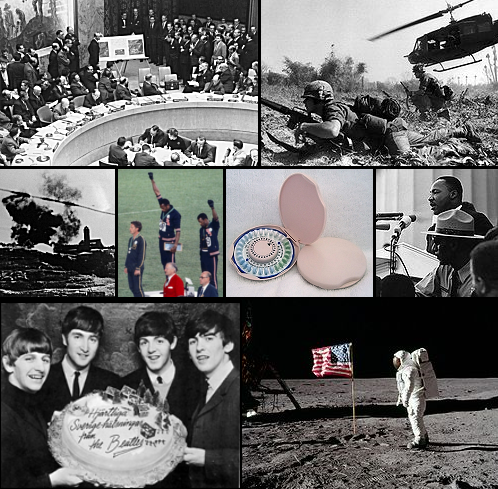
It’s interesting to hear people pining for a simpler time of the past. Because that simpler time for sure was not the 1960s. (And really, “a simpler time” never existed, it’s a fairy tale people like to tell us – but it’s not true.) Many things were epic about the 1960s.
The United States was involved in a decades-long war. There was massive political unrest and protests across the country. The older generation constantly complained about Those Kids Today, who have things so easy and are pointless slackers.
You know – nothing we could understand today.
While they didn’t have the joy that social media brings to us, and didn’t have as many mass shootings on a daily basis as we do today, there were other scary things going on. Major political figures were assassinated on camera. Planes were being hijacked on a regular basis. Bombs were mailed to people, or set off randomly.
But it was also a time of a commitment to exploring new ideas, to breaking free of out-of-date restrictions. Long hair, loud music, drugs, birth control pills – they were all symbols and opportunities of a new freedom that many people chose to explore.
So let’s go back in time this week, and explore this exciting era! Not everything was great, not everything was bad – but it was for sure a decade of huge change for everyone.
As always, the links below lead to Amazon.com. When you go there, if you buy anything Amazon will give us a small percent of their profits. Thank you in advance for your support of CMLE’s programs!

A Prayer for Owen Meany, by John Irving
In the summer of 1953, two 11-year-old boys – best friends – are playing in a Little League baseball game in Gravesend, New Hampshire. One of the boys hits a foul ball that kills the other boy’s mother. The boy who hits the ball doesn’t believe in accidents; Owen Meany believes he is God’s instrument. What happens to Owen after that 1953 foul ball is extraordinary and terrifying.

The Things They Carried, by Tim O’Brien
Depicting the men of Alpha Company—Jimmy Cross, Henry Dobbins, Rat Kiley, Mitchell Sanders, Norman Bowker, Kiowa, and the character Tim O’Brien, who survived his tour in Vietnam to become a father and writer at the age of forty-three—the stories in The Things They Carried opened our eyes to the nature of war in a way we will never forget. It is taught everywhere, from high school classrooms to graduate seminars in creative writing, and in the decades since its publication it has never failed to challenge our perceptions of fact and fiction, war and peace, and courage, longing, and fear.

Set The Night On Fire, by Libby Fischer Hellmann
Someone is trying to kill Lila Hilliard. During the Christmas holidays she returns from running errands to find her family home in flames, her father and brother trapped inside. Later, she is attacked by a mysterious man on a motorcycle. . . and the threats don’t end there. As Lila desperately tries to piece together who is after her and why, she uncovers information about her father’s past in Chicago during the volatile days of the late 1960s . . . information he never shared with her, but now threatens to destroy her. Part thriller, part historical novel, and part love story, Set the Night on Fire paints an unforgettable portrait of Chicago during a turbulent time: the riots at the Democratic Convention . . . the struggle for power between the Black Panthers and SDS . . . and a group of young idealists who tried to change the world.

They Come in All Colors, by Malcolm Hansen
It’s 1968 when fourteen-year-old Huey Fairchild begins high school at Claremont Prep, one of New York City’s most prestigious boys’ schools. His mother had uprooted her family from their small hometown of Akersburg, Georgia, leaving behind Huey’s white father and the racial unrest that ran deeper than the Chattahoochee River.
But for our sharp-tongued protagonist, forgetting the past is easier said than done. At Claremont, where the only other nonwhite person is the janitor, Huey quickly realizes that racism can lurk beneath even the nicest school uniform. After a momentary slip of his temper, Huey finds himself on academic probation and facing legal charges. With his promising school career in limbo, he begins to reflect on his memories of growing up in Akersburg during the Civil Rights Movement—and the chilling moments leading up to his and his mother’s flight north.

Flying Solo: An Unconventional Aviatrix Navigates Turbulence in Life, by Jeanette Vaughan
French Cajun Nora Broussard Greenwood was born with the wanderlust. Her adventurous spirit doesn’t fit the sedate expectations of catholic 1960s New Orleans suburbia. On a whim, she takes flying lessons to become a pilot. Experiencing the freedom of flight is liberating. However an illicit affair with her pilot instructor forces action. When she confronts her ruthless husband for a divorce, she is cast out sans her children and threatened with her life. Desperate to get them back and gain liberty, she steals her husband’s plane. Trials and tribulations erupt as she navigates the turbulence her life has become. In a bizarre twist of fate, she serves as caregiver to her lover’s sickly wife as a means to survive; hoping he will decide she is his soul mate. But is that to be? Nora must make the make the most difficult decision of her life in order to get things back on track.
